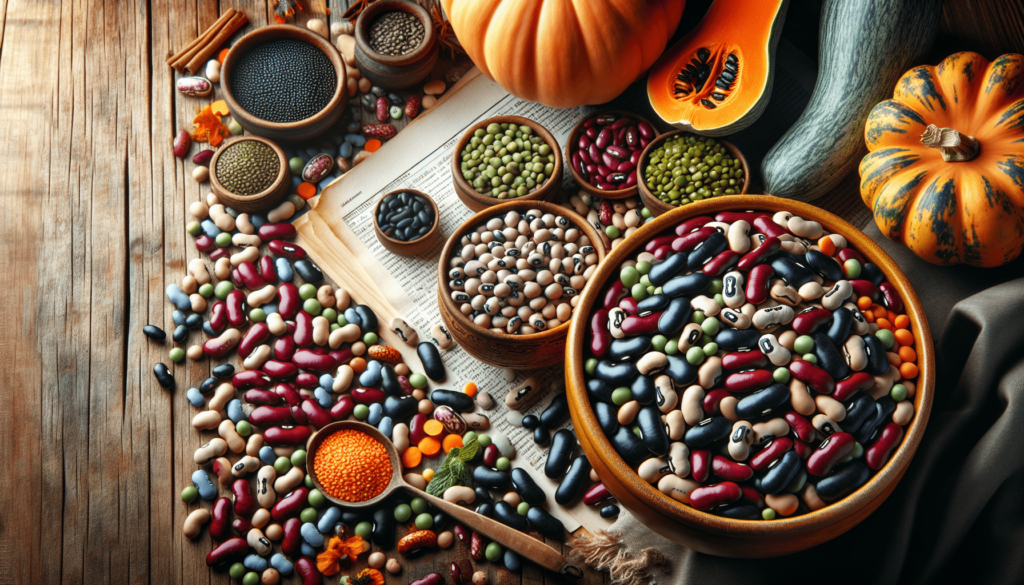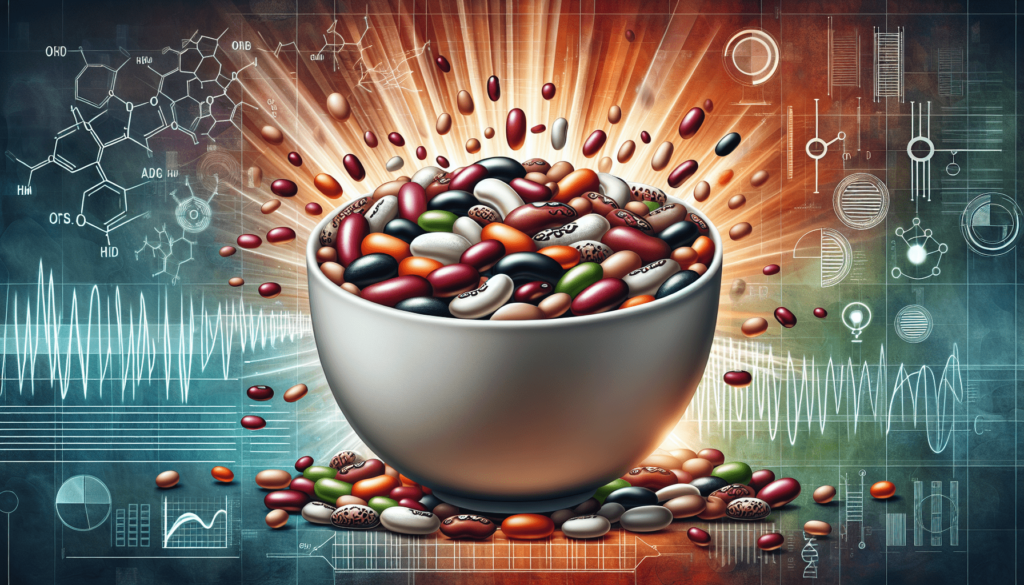You’ve probably heard that diet plays a significant role in maintaining a healthy cholesterol level. But did you know that the humble beans, those little legumes packed with protein and fiber, might just be the secret weapon in your battle against high cholesterol? The latest research suggests that consuming beans regularly could be beneficial in lowering cholesterol levels. This article will explore the potential impact of bean consumption on cholesterol and provide you with some delicious bean-based recipes to incorporate into your diet. So grab a can of beans and get ready to amp up your heart health!

What is cholesterol?
Cholesterol is a waxy substance found in your body that is necessary for the proper functioning of your cells. It plays a crucial role in the production of hormones, vitamin D, and substances that aid digestion. However, having excessive levels of cholesterol in your blood can lead to serious health problems, such as heart disease.
Definition of cholesterol
Cholesterol refers to a lipid molecule that is produced by your liver and can also be obtained through certain foods. It is transported through your blood in the form of lipoproteins, which are classified into two main types: low-density lipoprotein (LDL) and high-density lipoprotein (HDL).
Types of cholesterol
LDL cholesterol, often referred to as “bad” cholesterol, can build up in the walls of your arteries, leading to the formation of plaque and increasing the risk of heart disease. On the other hand, HDL cholesterol, known as “good” cholesterol, helps remove LDL cholesterol from the arteries, reducing the risk of heart disease.
Importance of managing cholesterol levels
Managing your cholesterol levels is essential for maintaining good heart health. High levels of LDL cholesterol increase the risk of developing heart disease, while low levels of HDL cholesterol can also be detrimental. By maintaining optimal cholesterol levels, you can reduce the likelihood of developing cardiovascular problems and enjoy a healthier life.
Link between diet and cholesterol levels
The food choices you make have a significant impact on your cholesterol levels. A diet high in certain types of fats, such as saturated fats and trans fats, can raise your LDL cholesterol levels. Conversely, consuming foods that are low in cholesterol and saturated fats can help lower your cholesterol levels and promote heart health.
Impact of dietary choices on cholesterol
Your dietary choices play a critical role in determining your cholesterol levels. Foods that are high in saturated fats, such as red meat, full-fat dairy products, and tropical oils, can increase LDL cholesterol levels. On the other hand, a diet rich in fruits, vegetables, whole grains, and lean proteins can help lower LDL cholesterol and boost HDL cholesterol.
Role of saturated fats and trans fats
Saturated fats and trans fats are known to raise LDL cholesterol levels. Saturated fats are commonly found in animal-based products, such as fatty meats, butter, and full-fat dairy. Trans fats, on the other hand, are often found in processed and fried foods, such as packaged snacks and fast food. By reducing your intake of these fats, you can effectively lower your cholesterol levels.
Benefits of consuming foods that lower cholesterol
Incorporating foods into your diet that can actively lower your cholesterol levels can have numerous benefits for your overall health. Not only can it decrease your risk of heart disease, but it can also promote better blood circulation, improve your energy levels, and support healthy weight management. By making conscious dietary choices, you can take control of your cholesterol levels and maintain optimal health.
Nutritional composition of beans
Beans are a versatile and nutritious food that can be easily incorporated into a well-balanced diet. They come in various types, each with its unique nutritional profile, but all share certain characteristics that make them beneficial for cholesterol management.
Overview of different types of beans
There are numerous types of beans available, including black beans, kidney beans, pinto beans, chickpeas, and lentils, to name just a few. They vary in color, flavor, and texture, but all are excellent sources of nutrients and can be used in a variety of dishes.
High fiber content in beans
Beans are incredibly rich in dietary fiber, which plays a crucial role in maintaining healthy cholesterol levels. Fiber helps to reduce the absorption of cholesterol in the intestine, preventing it from entering the bloodstream. By regularly consuming beans, you can increase your fiber intake and promote better cholesterol management.
Low saturated fat and cholesterol content in beans
One of the significant advantages of beans is that they are naturally low in both saturated fat and cholesterol. Unlike animal-based sources of protein, beans offer a plant-based alternative that can help you keep your saturated fat intake in check. By substituting beans for high-fat animal products, you can effectively lower your cholesterol levels and reduce your risk of heart disease.
Rich source of plant protein
Beans are an excellent source of plant-based protein, making them a valuable addition to vegetarian or vegan diets. Protein is an essential macronutrient that is necessary for many bodily functions, including cell repair and growth. By incorporating beans into your meals, you can ensure you’re meeting your protein needs while avoiding the cholesterol and saturated fat found in animal protein sources.
How do beans lower cholesterol?
Beans offer several mechanisms through which they can effectively lower cholesterol levels. These include their high soluble fiber content, the presence of phytosterols, and their impact on overall cholesterol metabolism.
Soluble fiber and its effect on cholesterol
The high soluble fiber content in beans is one of the key factors responsible for their cholesterol-lowering properties. Soluble fiber binds with cholesterol in the digestive tract, preventing its absorption into the bloodstream. This leads to a reduction in LDL cholesterol levels and an overall improvement in cholesterol management.
Role of phytosterols in lowering LDL cholesterol
Phytosterols are naturally occurring compounds found in plants, including beans. They have a molecular structure similar to that of cholesterol, which enables them to compete with cholesterol for absorption in the intestines. By inhibiting the absorption of cholesterol, phytosterols help to lower LDL cholesterol levels and promote a healthier lipid profile.
Impact of bean protein on cholesterol levels
Bean protein has also been shown to have a positive impact on cholesterol levels. Studies have demonstrated that consuming diets high in plant protein, such as that found in beans, can lead to a reduction in LDL cholesterol and an increase in HDL cholesterol. This protein source is not only low in saturated fat but also helps maintain healthy cholesterol levels, making beans an excellent choice for those looking to manage their cholesterol.

Evidence from scientific studies
Numerous scientific studies have shed light on the relationship between beans and cholesterol management. These studies have provided valuable insights into the specific effects of beans on cholesterol levels and have shown promising results.
Research studies on the relationship between beans and cholesterol
Several research studies have focused on examining the impact of bean consumption on cholesterol levels. For example, a study published in the Journal of Nutrition found that consuming half a cup of cooked beans daily for eight weeks led to a significant reduction in LDL cholesterol levels. Other studies have reported similar findings, supporting the cholesterol-lowering benefits of beans.
Results and conclusions from clinical trials
Clinical trials have further validated the cholesterol-lowering effects of beans. In a randomized controlled trial published in the Archives of Internal Medicine, researchers found that a diet rich in legumes, including beans, led to a decrease in LDL cholesterol levels and improved overall heart health. These trials provide strong evidence that incorporating beans into your diet can have a positive impact on your cholesterol management.
Comparison with other foods known to lower cholesterol
When comparing beans to other foods known for their cholesterol-lowering properties, beans stand out as an excellent choice due to their high nutritional value and versatility. While foods like oats, nuts, and seafood also have cholesterol-lowering effects, beans offer additional benefits, such as their fiber content and plant protein, making them a valuable addition to any cholesterol-lowering diet.
Recommended bean consumption
To effectively manage your cholesterol levels, it is important to know the recommended serving size of beans and understand the specific cholesterol-lowering benefits of different types of beans.
Daily serving size of beans for cholesterol management
The American Heart Association recommends consuming at least three servings of beans or legumes per week. Each serving should be around three-quarters of a cup, cooked. By adhering to this guideline, you can ensure that you are consistently incorporating beans into your diet and reaping their cholesterol-lowering benefits.
Types of beans and their specific cholesterol-lowering benefits
Different types of beans offer distinct nutritional profiles and specific benefits for cholesterol management. For example, black beans and kidney beans are particularly high in fiber, while chickpeas and lentils provide an excellent plant-based protein source. By diversifying your bean consumption, you can enjoy a range of health benefits while effectively managing your cholesterol levels.
Incorporating beans into a well-balanced diet
Incorporating beans into your diet doesn’t have to be complicated. They can be easily added to soups, stews, salads, and side dishes to boost their nutritional value. By substituting beans for other sources of protein, such as meat or cheese, in your meals, you can promote better cholesterol management and enjoy the many health benefits beans have to offer.
Other health benefits of beans
In addition to their cholesterol-lowering properties, beans offer a plethora of other health benefits that make them a valuable addition to any diet.
Impact on maintaining a healthy weight
Beans are a highly satisfying food due to their high fiber and protein content. By adding beans to your meals, you can promote satiety and reduce overall calorie intake, aiding in weight management. Additionally, the low fat content in beans makes them an excellent choice for those looking to maintain a healthy weight.
Effectiveness in managing blood sugar levels
Beans have a low glycemic index, which means they have a minimal impact on blood sugar levels. By incorporating beans into your diet, you can help regulate your blood sugar levels and reduce the risk of developing type 2 diabetes. They provide a slow and steady release of energy, keeping you satisfied and preventing blood sugar spikes.
Contribution to heart health
Beyond their cholesterol-lowering effects, beans offer numerous benefits for heart health. The high fiber content found in beans can help regulate blood pressure and reduce the risk of developing cardiovascular disease. Additionally, their magnesium and potassium content supports a healthy heart rhythm and aids in overall heart function.
Promotion of digestive health
Beans are an excellent source of dietary fiber, which promotes healthy digestion. By consuming beans regularly, you can improve your bowel regularity, prevent constipation, and support a healthy gut microbiome. Additionally, the fiber in beans acts as a prebiotic, providing nourishment for beneficial gut bacteria.
Considerations and precautions
While beans offer numerous health benefits, there are a few considerations and precautions to keep in mind when incorporating them into your diet.
Allergies or intolerances to beans
Some individuals may be allergic to beans or experience gastrointestinal discomfort when consuming them. It is important to be aware of any allergies or intolerances you may have and to listen to your body. If you experience adverse reactions after consuming beans, it is best to discontinue their consumption and consult a healthcare professional.
Digestive issues associated with bean consumption
Beans can often cause gas and bloating due to their high fiber content and complex carbohydrates. To minimize these side effects, it is recommended to gradually increase your bean consumption, soak dried beans before cooking them, or opt for canned beans, which have been precooked and may be more easily digestible for some.
Preparation methods and their impact on health benefits
While beans themselves offer significant health benefits, the way they are prepared and cooked can affect their nutrient content. To maximize their nutritional value, it is best to cook beans from scratch, using minimal amounts of salt and unhealthy fats. Additionally, incorporating a variety of herbs and spices can enhance the flavor of beans without compromising their health benefits.
Incorporating beans into diverse meal plans
Beans are a versatile food that can be incorporated into a variety of meal plans and dietary preferences. Whether you follow a vegetarian, vegan, or omnivorous diet, beans offer a valuable source of nutrition. By experimenting with different bean varieties and incorporating them into a range of dishes, you can enjoy the full range of health benefits they provide.
Tips for including beans in your diet
Incorporating beans into your diet doesn’t have to be challenging. Here are some easy tips to help you include beans in your meals and make the most of their cholesterol-lowering benefits.
Variety of ways to incorporate beans in meals
Beans can be added to a wide range of dishes to enhance flavor, texture, and nutritional value. They can be used in soups, stews, salads, wraps, and casseroles. Additionally, mashing beans can create delicious bean dips or spreads to use as a condiment or topping.
Recipes and cooking methods for preparing beans
There are countless recipes available that showcase the versatility of beans. From chili to bean burgers to hummus, the possibilities are endless. Experimenting with different cooking methods, such as pressure cooking, slow cooking, or even sprouting beans, can provide you with an array of tasty and nutritious options.
Ideas for using beans as a meat substitute
Beans can act as a fantastic meat substitute in various dishes. For example, try using mashed beans as a filling for vegetarian tacos or add cooked beans to a pasta sauce in place of ground meat. By substituting beans for meat, you can reduce your saturated fat and cholesterol intake while still enjoying delicious and satisfying meals.
Consulting a healthcare professional
Before making any significant dietary changes, it is always important to consult with a healthcare professional, such as a doctor or a nutritionist. They can provide individualized recommendations based on your specific health needs, help monitor your cholesterol levels, and advise on any necessary adjustments to your bean consumption. By working with a healthcare professional, you can ensure that you are making the best choices for your overall health and well-being.
